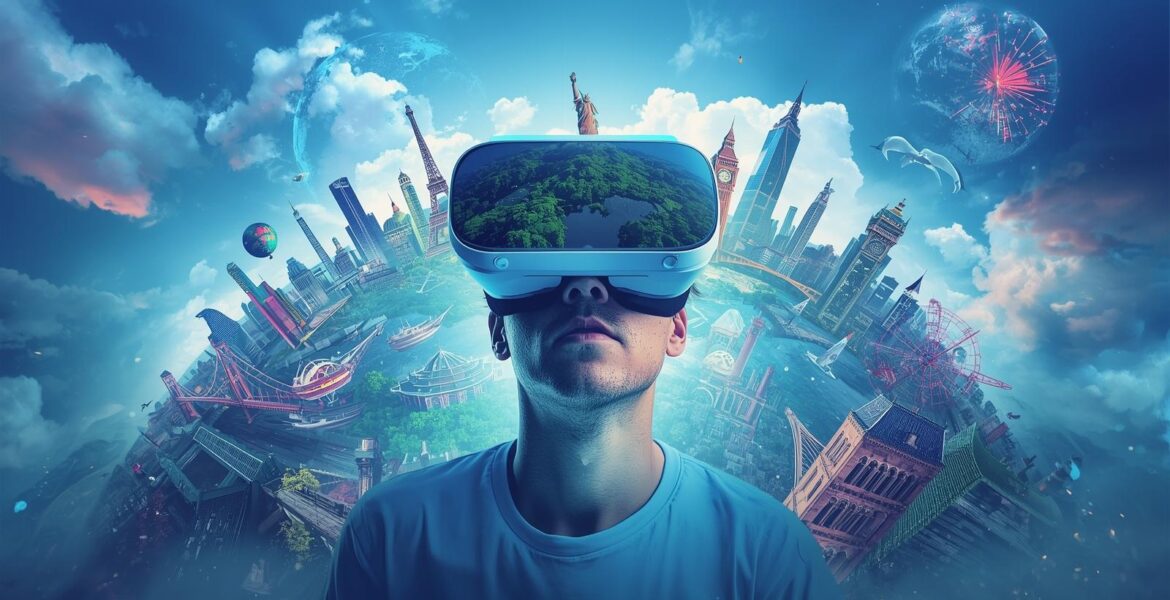In an age where technology continually reshapes our perceptions and experiences, virtual reality (VR) is emerging as a powerful tool in the travel industry. With the capacity to transport individuals to far-off destinations without leaving the comfort of their homes, VR is redefining what it means to explore the world. This transformation offers profound implications for travel agents, lifestyle influencers, and hotel managers alike. Let’s delve into how VR is reshaping travel experiences and uncover the possibilities it holds for the future.
Virtual reality travel apps offer an immersive escape, crafting experiences that are both accessible and awe-inspiring. For those unable to traverse the globe due to physical, financial, or time constraints, VR serves as a gateway to new worlds. This technology allows users to walk through bustling markets in Marrakech, stand on the windswept cliffs of Ireland, or gaze at the Northern Lights shimmering above a Norwegian fjord—all with a VR headset.
The rise of virtual reality travel apps has opened a new dimension in travel planning and experiences. These apps offer virtual tours of landmarks, cultural sites, and natural wonders, providing users with a rich tapestry of experiences from around the globe. VR travel apps are particularly beneficial for seniors, offering them a chance to visit places they might find physically challenging to access.
For travel agents, these apps are indispensable tools. They provide clients with a preview of destinations, allowing them to make informed decisions about where to travel next. This feature is especially valuable for crafting unique, off-the-beaten-path itineraries that emphasize authentic connections and cultural immersion.
One of the most compelling aspects of virtual reality is its ability to tell stories. Through immersive storytelling, VR transports users into the narrative, allowing them to engage with a destination on a deeply personal level. This approach is transformative for lifestyle influencers seeking fresh, engaging content. By showcasing serene, understated luxury and genuine travel experiences, influencers can capture their audience’s imagination and loyalty.
Virtual reality travel for seniors is a burgeoning field, providing opportunities to explore without physical limitations. Seniors can revisit cherished destinations from their youth or explore new locales they have always dreamed of visiting. VR offers a safe and comfortable way to experience the world, potentially alleviating feelings of isolation and enhancing their quality of life.
For hotel managers, integrating VR experiences into their offerings can enhance appeal to discerning travelers. By providing virtual tours of the hotel and its surroundings, potential guests can appreciate the local context and authenticity before booking their stay. This approach aligns with travelers who prioritize meaningful and memorable experiences over flashy amenities.
Virtual reality is not just about visual experiences; it also offers an auditory and cultural immersion. By incorporating local sounds, languages, and music, VR can deepen users’ understanding and appreciation of a destination’s cultural heritage. This holistic approach fosters a greater connection with the place, promoting a form of travel that prioritizes genuine experiences and meaningful moments.
As VR technology continues to evolve, its applications in the travel industry will expand. Future developments may include more interactive elements, allowing users to participate in local activities or festivals virtually. Imagine joining a Japanese tea ceremony, learning traditional dances in Bali, or cooking a classic Italian dish, all through the power of VR.
For travel agents, this means an opportunity to offer clients a richer, more nuanced understanding of their destinations. Lifestyle influencers can leverage these immersive experiences to create captivating content that stands out in the crowded travel and lifestyle niche. Hotel managers can attract a new wave of travelers who value authenticity and local context.
To fully harness the potential of virtual reality in travel, industry professionals should consider the following:
- Invest in VR Technology: Equip your business with the latest VR headsets and software to offer clients immersive experiences.
- Create VR Content: Develop virtual tours and experiences that highlight the unique aspects of your destination or accommodation.
- Collaborate with Local Experts: Work with local guides and cultural experts to ensure your VR experiences are authentic and respectful of the destination’s heritage.
- Promote Accessibility: Ensure VR experiences are accessible to all, including seniors and individuals with disabilities.
- Embrace Sustainability: Use VR as a tool to promote sustainable travel practices and reduce the environmental impact of traditional tourism.
By integrating virtual reality into the travel experience, professionals can offer clients a new way to explore the world, one that is rich in authenticity, connection, and understanding.
Virtual reality is not merely a technological novelty; it is a profound shift in how we experience and understand the world. For travel agents, lifestyle influencers, and hotel managers, VR presents an opportunity to redefine travel experiences and offer clients something truly extraordinary. As we embrace this new frontier, let us do so with an open heart and a commitment to genuine, meaningful travel.


